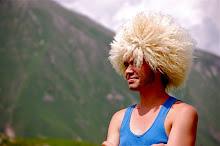The Human Rights Watch (HRW) issued its World Report 2010 on Jan. 20. The nongovernmental organization overviews major trends concerning Human Rights over the world.
As far as Georgia is concerned, the report focused on police violence, violations of law during the 2008 Russian-Georgian conflict in South Ossetia, the criminal justice system and media freedom.
Last spring, from April to June, opposition supporters were permitted by Saakashvili’s government to march through Tbilisi’s main streets. However, police used excessive force against demonstrators and journalists. The police department undertook different internal investigations and members of the government apologized for these acts, but no complete inquiry was conducted.
“What we are saying is that there’s a lack of comprehensive investigation, and none of them has been completed,” said Giorgi Gogia, Caucasus researcher for HRW. “In fact, there was no prosecuted, no punished, no banished, it means no conclusive investigation. Apologies from different officials are not enough, it should be the result of a justice process of investigation which leads to conclusions.”
The report also criticized a new law that increases administrative detention from 30 to 90 days by stating “the measure appears excessive given that pretrial detention for criminal charges is only 60 days.”
Concerning the Georgian-Russian conflict, HRW denounced the use of indiscriminate force by both armies and the absence of any inquiry about that the conflict. However, since HRW published “up in flames” in 2009, there has been no investigation by the organization about the post-war aspects, Gogia said.
The report focused on the lack of transparency of media ownership in Georgia.
“In Georgia, pressure is coming from the owner,” Gogia said. “About influences, pressures, there’s a lack of understanding because ownership is hidden. Lots of media companies are offshore firms, and nobody knows who stands behind or who decides the policy of the media outlet.”
Gogia said he is also concerned about the amount of speech time that is devoted to the opposition on TV channels.
“Freedom of media is not only freedom of expression; it’s not enough to have opposition on media,” he said.
HRW also reported about the possible removal of newsstands from Tbilisi’s streets, a proposition that some elected municipals suggested last September. Such a move would almost certainly “threaten many print outlet’s existence.”
HRW’s World Report 2010 pointed out the human rights violations occurring in Georgia, but as Gogia said, “The report is a summary of the year, we are not making a comparison with the year before. In fact, in Georgia, violations of human rights have been increasing in the past and are still increasing nowadays.”
As far as Georgia is concerned, the report focused on police violence, violations of law during the 2008 Russian-Georgian conflict in South Ossetia, the criminal justice system and media freedom.
Last spring, from April to June, opposition supporters were permitted by Saakashvili’s government to march through Tbilisi’s main streets. However, police used excessive force against demonstrators and journalists. The police department undertook different internal investigations and members of the government apologized for these acts, but no complete inquiry was conducted.
“What we are saying is that there’s a lack of comprehensive investigation, and none of them has been completed,” said Giorgi Gogia, Caucasus researcher for HRW. “In fact, there was no prosecuted, no punished, no banished, it means no conclusive investigation. Apologies from different officials are not enough, it should be the result of a justice process of investigation which leads to conclusions.”
The report also criticized a new law that increases administrative detention from 30 to 90 days by stating “the measure appears excessive given that pretrial detention for criminal charges is only 60 days.”
Concerning the Georgian-Russian conflict, HRW denounced the use of indiscriminate force by both armies and the absence of any inquiry about that the conflict. However, since HRW published “up in flames” in 2009, there has been no investigation by the organization about the post-war aspects, Gogia said.
The report focused on the lack of transparency of media ownership in Georgia.
“In Georgia, pressure is coming from the owner,” Gogia said. “About influences, pressures, there’s a lack of understanding because ownership is hidden. Lots of media companies are offshore firms, and nobody knows who stands behind or who decides the policy of the media outlet.”
Gogia said he is also concerned about the amount of speech time that is devoted to the opposition on TV channels.
“Freedom of media is not only freedom of expression; it’s not enough to have opposition on media,” he said.
HRW also reported about the possible removal of newsstands from Tbilisi’s streets, a proposition that some elected municipals suggested last September. Such a move would almost certainly “threaten many print outlet’s existence.”
HRW’s World Report 2010 pointed out the human rights violations occurring in Georgia, but as Gogia said, “The report is a summary of the year, we are not making a comparison with the year before. In fact, in Georgia, violations of human rights have been increasing in the past and are still increasing nowadays.”
